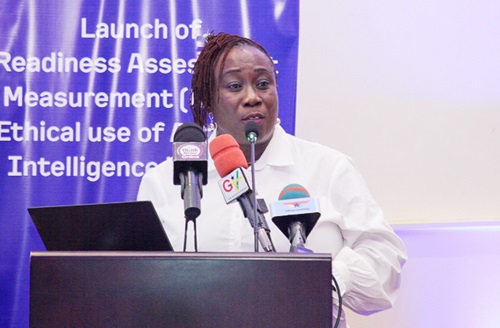- Login to ASPnet | Ghana Commission for UNESCO | Government Agency Responsible for the coordination of Ghana's contributions to and presence at UNESCO
UNESCO AI Ethics tool launched

A tool to assess the ethical use of Artificial Intelligence (AI) has been launched in Accra.
Known as the Readiness Assessment Methodology (RAM), the tool, developed by the United Nations Educational, Scientific and Cultural Organisation (UNESCO), measures how well countries are implementing recommendations by UNESCO on the responsible and ethical use of AI.
As part of the UNESCO recommendations, countries are expected to ensure that the use of AI respects and protects human rights, promotes peaceful, just and interconnected societies, protects the environment, and finally ensures diversity and inclusiveness.
Again under the UNESCO framework, countries have a responsibility to ensure that AI is not deployed in mass surveillance of people or used for social scoring, where governments allocate scores to their citizens and restrict access to social benefits based on the scores.
Ethics in AI
Speaking at the launch of the RAM, the Assistant Director-General of UNESCO in charge of Social and Human Sciences, Gabriella Ramos, said ethics were crucial in all fields, including technology.

The audience
AI, she said, held enormous potential for how the world operated, but added that if systems were not put in place to properly regulate it, it could become a tool for social anarchy and disservice.
“AI technology brings major benefits in many areas, but without the ethical guard rails, it risks producing real-world biases and discrimination, fuelling divisions and threatening fundamental human rights and freedoms,” she said.
Also, she said, AI technology was not evenly spread but was rather in the hands of few countries, and also male dominated.
Such a situation, she explained, would make accessibility to AI highly limited, further expanding inequalities.
“AI business models are highly concentrated in just a few countries and handful of firms, usually developed in male-dominated teams, without the cultural diversity that characterises our world,” she added.
Solution
To resolve such challenges, Ms Ramos said the 193 Member Countries of UNESCO adopted the recommendation in November 2021.
According to her, the recommendations were meant to ensure equity and proper use of AI, as well as create the legal framework that would harness the technology for public good.
“The recommendation establishes a set of values in line with the promotion and protection of human rights, human dignity and environmental sustainability. It also advances essential principles such as transparency, accountability and the rule of law, online,” she added.
National AI strategy
The Director-General of the Data Protection Commission, Patricia Adusei-Poku, said the RAM would positively complement the draft National AI Strategy which had been developed and set to be put before the cabinet.
“The RAM would help the country assess the current state of maturity around the use of AI. It will help us build a picture of our national state of readiness in the use of AI,” she said.
The National AI Strategy, which is the policy framework for AI in the country for the next 10 years, seeks to harness inclusive growth of AI across all sectors, use AI to improve the lives of people, while also making Ghana the leader of AI on the African continent.
It is premised on eight thematic areas – expand AI education and training, empower youth for the AI jobs of the future, deepen digital infrastructure and inclusion, facilitate data access and governance, coordinate a robust AI ecosystem and community, accelerate AI adoption across all sectors, invest in applied AI research and promote AI adoption in the public sector.
Mrs Adusei-Poku said there was the need for the government and the private sector to channel resources into AI research and innovation to help the country reap maximum benefits from AI.
“As a nation, we need to invest in AI. The pace of technological advancement does not wait for slow takers. Investment in research will help us keep abreast of technology,” she added.
Writer’s email: emma.hawkson@graphic.com.gh
